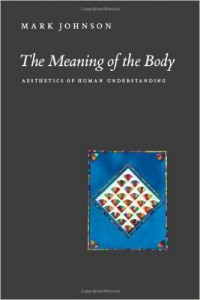 6. The Meaning of the Body by Mark Johnson
6. The Meaning of the Body by Mark Johnson
In The Meaning of the Body, Mark Johnson continues his pioneering work on the exciting connections between cognitive science, language, and meaning first begun in the classic Metaphors We Live By. Johnson uses recent research into infant psychology to show how the body generates meaning even before self-consciousness has fully developed. From there he turns to cognitive neuroscience to further explore the bodily origins of meaning, thought, and language and examines the many dimensions of meaning—including images, qualities, emotions, and metaphors—that are all rooted in the body’s physical encounters with the world. Drawing on the psychology of art and pragmatist philosophy, Johnson argues that all of these aspects of meaning-making are fundamentally aesthetic. He concludes that the arts are the culmination of human attempts to find meaning and that studying the aesthetic dimensions of our experience is crucial to unlocking meaning’s bodily sources.Throughout, Johnson puts forth a bold new conception of the mind rooted in the understanding that philosophy will matter to nonphilosophers only if it is built on a visceral connection to the world.
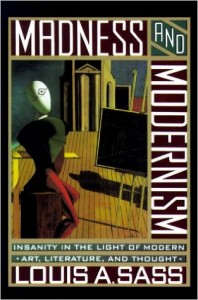 Madness and Modernism by Louis A. Sass
Madness and Modernism by Louis A. SassThe similarities between madness and modernism are striking: defiance of authority, nihilism, extreme relativism, distortions of time, strange transformations of self, and much more. In this book, Louis Sass, a clinical psychologist, offers a new vision of schizophrenia, comparing it with the works of such artists and writers as Kafka, Beckett, and Duchamp and philosophers including Nietzsche, Heidegger, Foucault and Derrida. It provides a portrait of the world of the madman, along with a commentary on modernist and postmodernist culture.
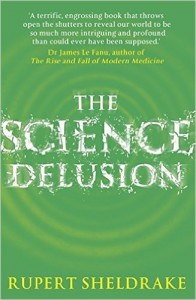 8. The Science Delusion by Rupert Sheldrake
8. The Science Delusion by Rupert Sheldrake
Freeing the Spirit of Inquiry: The science delusion is the belief that science already understands the nature of reality. The fundamental questions are answered, leaving only the details to be filled in. In this book (published in the US as Science Set Free), Dr Rupert Sheldrake, one of the world’s most innovative scientists, shows that science is being constricted by assumptions that have hardened into dogmas. The ‘scientific worldview’ has become a belief system. All reality is material or physical. The world is a machine, made up of dead matter. Nature is purposeless. Consciousness is nothing but the physical activity of the brain. Free will is an illusion. God exists only as an idea in human minds, imprisoned within our skulls. Sheldrake examines these dogmas scientifically, and shows persuasively that science would be better off without them: freer, more interesting, and more fun. In The God Delusion Richard Dawkins used science to bash God, but here Rupert Sheldrake shows that Dawkins’ understanding of what science can do is old-fashioned and itself a delusion.
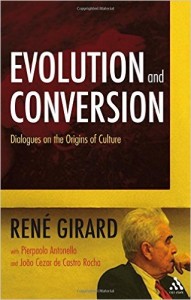 9. Evolution and Culture by Rene Girard
9. Evolution and Culture by Rene Girard
René Girard is one of the most brilliant and striking intellectuals of the 20th century. His theory on the imitative nature of desire and on the violent origin of culture has been at the centre of the philosophical and theoretical debate since the publication in 1971 of his seminal book: Violence and the Sacred. His reflection on the relationship between violence and religion is one of the most original and persuasive and, given the urgency of this issue in our contemporary world, demands a reappraisal.
Girard, who has been hailed by Michel Serres as “the Charles Darwin” of human sciences, is in fact one of the few thinkers in the humanities and social sciences that takes into full consideration an evolutionary perspective to explain the emergence of culture and institutions. The authors draw out this aspect of his thought by foregrounding ethological, anthropological and evolutionary theories.
Methodological and epistemological systematization has also been lacking in Girard’s previous books, and by questioning him on the issue of evidence and truth, the authors provide a convincing framework for further inquiries. In the last chapters, Girard proposes a provocative re-reading of the Biblical texts, seen as the culmination of an enduring process of historical awareness of the presence and function of collective violence in our world. In fact, Girard’s long argument is a historical spiral in which the origin of culture and archaic religion is reunited with the contemporary world by means of a reinterpretation of Christianity and its revelation of the intrinsic violent nature of the human being.
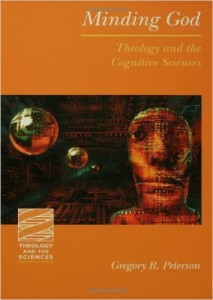 10. Minding God by Gregory R. Peterson
10. Minding God by Gregory R. Peterson
Does it make sense to speak of the “mind of God”? Are humans unique? Do we have souls? Our growing explorations of the cognitive sciences pose significant challenges to and opportunities for theological reflection. Gregory Peterson introduces these sciences: neuroscience, artificial intelligence, animal cognition, linguistics, and psychology-that specifically contribute to the new picture and their philosophical underpinnings. He shows its implications for rethinking longstanding Western assumptions about the unity of the self, the nature of consciousness, free will, inherited sin, and religious experience. Such findings also illumine our understanding of God’s own mind, the God-world relationship, new notions of divine design, and the implications of a universe of evolving minds. Peterson is gifted at explaining scientific concepts and drawing their implications for religious belief and theology. His work demonstrates how new work in cognitive sciences upends and reconfigures many popular assumptions about human uniqueness, mind-body relationship, and how we speak of divine and human intelligence.
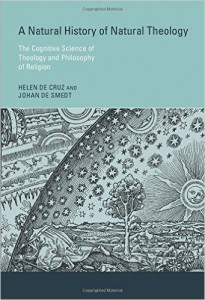 BONUS. A Natural History of Natural Theology: The Cognitive Science of Theology and Philosophy of Religion by Helen de Cruz and Johan de Smedt
BONUS. A Natural History of Natural Theology: The Cognitive Science of Theology and Philosophy of Religion by Helen de Cruz and Johan de Smedt
Questions about the existence and attributes of God form the subject matter of natural theology, which seeks to gain knowledge of the divine by relying on reason and experience of the world. Arguments in natural theology rely largely on intuitions and inferences that seem natural to us, occurring spontaneously — at the sight of a beautiful landscape, perhaps, or in wonderment at the complexity of the cosmos — even to a nonphilosopher. In this book, Helen De Cruz and Johan De Smedt examine the cognitive origins of arguments in natural theology. They find that although natural theological arguments can be very sophisticated, they are rooted in everyday intuitions about purpose, causation, agency, and morality. Using evidence and theories from disciplines including the cognitive science of religion, evolutionary ethics, evolutionary aesthetics, and the cognitive science of testimony, they show that these intuitions emerge early in development and are a stable part of human cognition.De Cruz and De Smedt analyze the cognitive underpinnings of five well-known arguments for the existence of God: the argument from design, the cosmological argument, the moral argument, the argument from beauty, and the argument from miracles. Finally, they consider whether the cognitive origins of these natural theological arguments should affect their rationality.
https://www.youtube.com/watch?v=j_OqqTfirgMIf you’ve gotten this far I suggest you also look at my nearly exhaustive list of books that demonstrate the vast areas of dialogue between contemporary religion and science.
Please drop something into the PayPal donation box on my homepage. I’m not entirely sure we can make rent next month. It will take a miracle.












